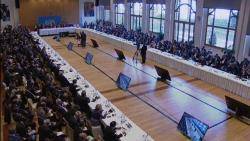Thousands of displaced families living in Lebanon are focused on daily concerns rather than ‘peace talks’.
As delegates meet in Geneva for a second time to discuss peace in Syria, Lebanese army tanks rolled past bullet-scared buildings in Tripoli's Sunni neighborhood of Bab al-Tabbaneh. Watching them pass along Syria Street, men on the sidewalk cheered the news of a deadly explosion in Hezbollah's Beirut stronghold of Haret Hreik on Tuesday.
Armed groups from the Bab al-Tabbaneh suburb, supporters of the revolt against the Syrian regime, have repeatedly clashed with their predominantly Alawite neighbors in nearby Jabal Mohsen, who favor Syrian President Bashir al-Assad.
Abu Al-Baraa, a sheikh in Bab al-Tabbaneh, dates the ongoing violence back to Lebanon's civil war. But the Syrian war and deadly bombings of two Sunni mosques in Tripoli last August, which killed 47 and injured hundreds, have exacerbated the conflict, leaving civilians terrified and neighborhoods in tatters.
"Lebanon is deeply intertwined with what's happening in Syria," Al-Baraa said. "If the Geneva II talks reach a final resolution where Bashar Assad and the whole regime leave the Syrian republic, then we will definitely have no problems here. But as long as there is a rebellion in Syria, the situation is not going to change."
A follow up to an initial conference in Geneva in June 2012 that lost momentum as soon as it concluded, the Geneva II talks are contentious, with key players such as Iran and major Syrian opposition groups conspicuously absent.
"I think realistically no-one really goes to Geneva expecting a fully formed transitional government to come out of it," said Aron Lund, the editor of the Syria in Crisis website used by the Carnegie Endowment for International Peace. "They hope some results will come out of it, whether it's limited progress like some local ceasefires or commonly accepted rules on how to treat humanitarian assistance for cities under siege. That would be progress of some kind.
"The other aspect is perhaps just to get the political process going again, which broke off immediately after Geneva I. In a sense, the Geneva II meeting is really a step on the way to Geneva III, to turn the Geneva conference into something more permanent, by creating a contact mechanism for states."
An estimated 130,000 Syrians have been killed since the start of the conflict in 2011. The United Nations has registered more than 2.3 million refugees outside the country, with at least 800,000 in Lebanon alone. The real numbers are thought to be much higher. Seven leading organizations, including Human Rights Watch and Amnesty International, have called the crisis "the worst of our time".
Lebanon has been hit hard by crisis. Complex and conflicting Lebanese and international interests leading to government paralysis, the ongoing Hariri Tribunal, the uptick in sectarian violence, and a worsening economy have deepened the impact of the raging war.
In an overcrowded Tripoli clinic distributing free medical care, Syrian refugees are focused on their daily survival. "I don't know about the Geneva II talks," shrugged Dr Maher Al Kashef from Latakia, who said his patient caseload has skyrocketed. "I don't know what will happen to Syria in the future, and I don't know when we will return to Syria."
In the waiting room, Badour, a middle-aged woman from Homs, said her family now lives near the frontlines of the fighting between Bab al-Tabbaneh and Jabal Mohsen here in Tripoli. "We are suffering the same thing. We are always afraid and hear the clashes on a daily basis," she said. "I've heard of the Geneva talks, but if they don't remove Assad, what are we going to do? We've lost everything."
Across town, piles of fetid garbage and pools of mud line a dirt track into a makeshift refugee settlement along the coast. Since Lebanon, with an eye to Palestinian camps on Lebanese soil since 1948, has refused formal settlements to house Syrian refugees, vulnerable Syrians are at the mercy of skyrocketing rents in often substandard, exploitative conditions.
Wala'a lies on a narrow mattress in a three-by-three meter single-room concrete structure, with a piece of tattered cloth to hide the toilet. She believes the water has made her ill, and is taking medicine to stop vomiting.
Having arrived from Homs three weeks ago, 20-year-old Wala'a shares the space with four other family members for $200 a month - and they are already in debt.
"We've heard about the Geneva talks and we really hope something comes out of this, but we don't think so," said her widowed mother-in-law, Sabah, who believes they could get arrested by the regime for alleged affiliation with the Free Syria Army (FSA) if they were to return.
And the family is afraid at night. "We came from Syria where we heard nothing but bullets," said Sabah. "And we are hearing nothing but bullets now."
PHOTO CAPTION
Delegates in Geneva, Switzerland meeting for ‘peace talks’ about Syria's war.
Source: Aljazeera.com


 Home
Home Discover Islam
Discover Islam Quran Recitations
Quran Recitations Lectures
Lectures
 Fatwa
Fatwa Articles
Articles Fiqh
Fiqh E-Books
E-Books Boys & Girls
Boys & Girls  Ramadan
Ramadan Fatwa Audios
Fatwa Audios Month of Mercy
Month of Mercy Women
Women Eed Al- Fitr
Eed Al- Fitr Food Recipes
Food Recipes Videos
Videos

 Prayer Times
Prayer Times












